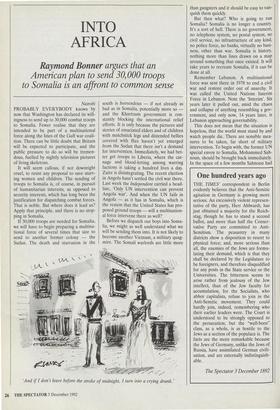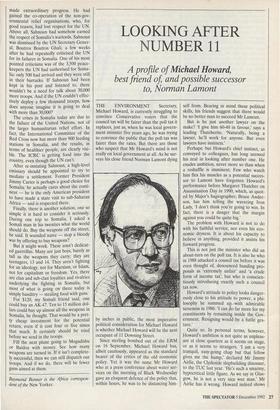INTO AFRICA
Raymond Bonner argues that an American plan to send 30,000 troops to Somalia is an affront to common sense Nairobi PROBABLY EVERYBODY knows by now that Washington has declared its will- ingness to send up to 30,000 combat troops to Somalia. Fewer realise that they are intended to be part of a multinational force along the lines of the Gulf war coali- tion. There can be little doubt that Britain will be expected to participate, and the public pressure to do so will be tremen- dous, fuelled by nightly television pictures of living skeletons.
It will seem callous, if not downright cruel, to resist any proposal to save starv- ing women and children. The sending of troops to Somalia is, of course, in pursuit of humanitarian interests, as opposed to security interests, which has long been the justification for dispatching combat forces. That is noble. But where does it lead us? Apply that principle, and there is no stop- ping in Somalia.
If 30,000 troops are needed for Somalia, we will have to begin preparing a multina- tional force of several times that size to send to another former colony — the Sudan. The death and starvation in the
south is horrendous — if not already as bad as in Somalia, potentially more so — and the Khartoum government is con- stantly blocking the international relief efforts. It is only because the pictures and stories of emaciated elders and of children with matchstick legs and distended bellies covered with flies haven't yet emerged from the Sudan that there isn't a demand for intervention. Immediately, we had bet- ter get troops to Liberia, where the car- nage and blood-letting among warring factions is taking a hundred lives a day. Zaire is disintegrating. The recent election in Angola hasn't settled the civil war there. Last week the Independent carried a head- line, 'Only UN intervention can prevent Angola war'. And when the UN fails in Angola — as it has in Somalia, which is the reason that the United States has pro- posed ground troops — will a multination- al force intervene there as well?
Before we dispatch our boys into Soma- lia, we might as well understand what we will be sending them into. It is not likely to become another Vietnam, a military quag- mire. The Somali warlords are little more 'And if I don't leave before the stroke of midnight, I turn into a crying drunk.' than gangsters and it should be easy to van- quish them quickly.
But then what? Who is going to run Somalia? Somalia is no longer a country. It's a sort of hell. There is no government, no telephone system, no postal system, no civil service, no infrastructure of any kind, no police force, no banks, virtually no busi- ness, other than war. Somalia is history, nothing more than lines drawn on a map around something that once existed. It will take years to recreate Somalia, if it can be done at all.
Remember Lebanon. A multinational force was sent there in 1978 to end a civil war and restore order out of anarchy. It was called the United Nations Interim Force in Lebanon. Note the 'Interim'. Six years later it pulled out, amid the chaos and collapse of anything resembling a gov- ernment, and only now, 14 years later, is Lebanon approaching governability.
This does not mean that the situation is hopeless, that the world must stand by and watch people die. There are sensible mea- sures to be taken, far short of military intervention. To begin with, the former UN special envoy to Somalia, Mohammed Sah- noun, should be brought back immediately. In the space of a few months Sahnoun had made extraordinary progress. He had gained the co-operation of the non-gov- ernmental relief organisations, who, for good reason, had lost respect for the UN. Above all, Sahnoun had somehow earned the respect of Somalia's warlords. Sahnoun was dismissed by the UN Secretary Gener- al, Boutros Boutros Ghali, a few weeks after he had repeatedly criticised the UN for its failures in Somalia. One of his most pointed criticisms was of the 3,500 peace- keepers the UN had authorised for Soma- ha: only 500 had arrived and they were still in their barracks. If Sahnoun had been kept in his post and listened to, there wouldn't be a need for talk about 30,000 more troops. And if the UN couldn't effec- tively deploy a few thousand troops, how does anyone imagine it is going to deal with more than 30,000?
The crises in Somalia today are due to the failure of the United Nations, not of the larger humanitarian relief effort. In fact, the International Committee of the Red Cross now has more than 900 feeding stations in Somalia, and the results, in terms of healthier people, are clearly visi- ble. The ICRC is getting food into the country, even though the UN can't. After re-instating Sahnoun, a high-level emissary should be appointed to try to mediate a settlement. Former President Jimmy Carter is perhaps a good choice for Somalia: he actually cares about the conti- nent — he is the only American president to have made a state visit to sub-Saharan Africa — and is respected there. Finally, there is another solution, one so simple it is hard to consider it seriously. During one trip to Somalia, I asked a Somali man in his twenties what the world should do. Buy the weapons off the street, he said. It sounded naive — stop a bloody war by offering to buy weapons? But it might work. These aren't dedicat- ed guerrillas. Many are just boys, barely as tall as the weapons they carry; they are teenagers, 13 and 14. They aren't fighting for an ideology, not for Marxism, or Islam, not for capitalism or freedom. Yes, there are clan and sub-clan loyalties and rivalries underlying the fighting in Somalia, but most of what is going on there today is simply banditry — stealing food with guns. For $120, my Somali friend said, one could buy an AK-47. Ten to 15 million dol- lars could buy up almost all the weapons in Somalia, he thought. That would be a pret- ty cheap investment for the potential return, even if it cost four or five times that much. It certainly should be tried before we send in the troops.
Fill the next plane going to Mogadishu or Baidoa with money. See how many weapons are turned in. If it isn't complete- ly successful, then we can still dispatch our troops. And if we do, there will be fewer guns aimed at them.
Raymond Bonner is the Africa correspon- dent of the New Yorker.











































































 Previous page
Previous page